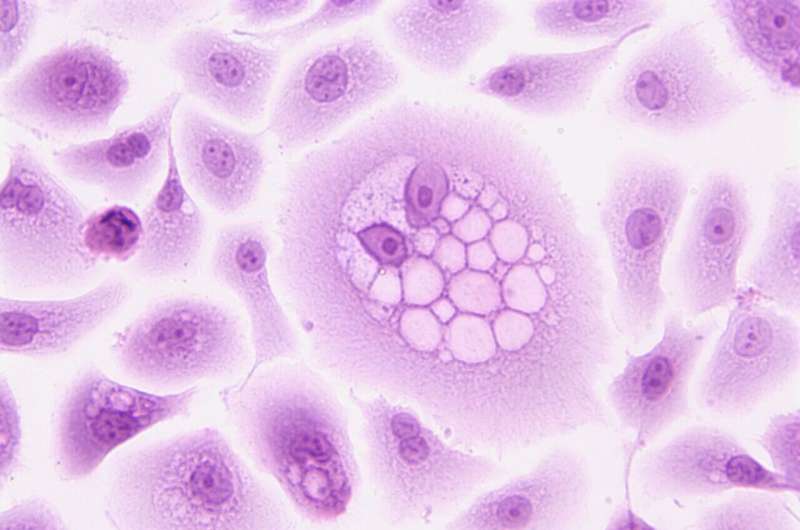This article has been reviewed according to Science X's editorial process and policies. Editors have highlighted the following attributes while ensuring the content's credibility:
fact-checked
peer-reviewed publication
trusted source
proofread
Combining epigenetic cancer medications may have benefit for colorectal cancers and other tumor types

A pair of medications that make malignant cells act as if they have a virus could hold new promise for treating colorectal cancers and other solid tumors, reports a study published in Science Advances.
The preclinical research, led by Van Andel Institute scientists, determined how low doses of a DNMT inhibitor sensitize cancer cells to an EZH2 inhibitor, resulting in a one-two punch that combats cancer cells better than either drug alone.
The findings are the foundation for an upcoming Phase I clinical trial to evaluate this combination in people with colorectal cancer or other solid tumors.
"DNMT inhibitors are approved to treat blood cancer while EZH2 inhibitors are approved to treat blood cancer and a rare type of sarcoma. To date, they've had limited individual success in solid tumors like colorectal cancer," said Van Andel Institute Professor Scott Rothbart, Ph.D., the study's corresponding author.
"Our findings highlight the promise of combination cancer therapies by revealing how these two medications interact, with the DNMT inhibitor priming cancer cells in a way that makes the EZH2 inhibitor more effective."
DNMT and EZH2 inhibitors work by controlling the epigenetic processes that regulate gene expression. In cancer, epigenetic errors enable malignant cells to survive and proliferate—and offer critical targets for treatment.
Previous studies show that DNMT inhibitors cause cancer cells to behave as if infected by a virus, which makes the cells more susceptible to attack by one's own immune system.
In their new study, Rothbart and colleagues demonstrated that combining DNMT and EZH2 inhibitors activates this viral mimicry process more effectively than either drug on its own. The upcoming trial will be the first time these two medication types will be combined to enhance the activities of these inhibitors in solid tumors.
Colorectal cancers are the second leading cause of cancer death globally, according to the World Health Organization. More than 1.9 million cases were diagnosed in 2020, with incidence expected to rise to 3.2 million cases by 2040. Although screening and early detection have driven down colorectal cancer rates among older people in the U.S., rates are rising in younger people.
"Although it is not clear why colorectal cancer cases are rising among young people, it is clear that we need more effective treatment strategies," Rothbart said.
"Combining medications may be a powerful way to simultaneously target multiple drivers of cancer. In addition to revealing how DNMT and EZH2 inhibitors work together, our findings suggest that epigenetic drugs also may sensitize tumors to immunotherapy, which offers another important opportunity to enhance cancer treatment."
More information: Alison Chomiak et al, Select EZH2 inhibitors enhance viral mimicry effects of DNMT inhibition through a mechanism involving NFAT:AP-1 signaling, Science Advances (2024). DOI: 10.1126/sciadv.adk4423. www.science.org/doi/10.1126/sciadv.adk4423

















